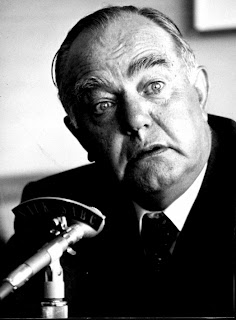In the novel Waiting for the Barbarians, the story's narrator, the Magistrate, provides great insight in to the tale of a barbarian girl, victimized by the immoral acts committed by Colonel Joll. Through the tale of this girl, and having seen the very acts committed before him, the Magistrate comes to many significant realizations.
One crucial realization that the Magistrates comes to is that the Empire is in fact the enemy. Caught between the frontier town and the way of the barbarians, and the forces of Colonel Joll (which represent the Empire), the Magistrate becomes aware of the fact that the Empire, while it makes the barbarians out to look like savage beasts, is in fact the enemy, behaving in a cruel and inhumane manner towards its less-civilized counterpart. In an argument with the Colonel the Magistrate states, "'those pitiable prisoners you brought in-are they the enemy I must fear? Is that what you say? You are the enemy, Colonel! ... You are the enemy, you have made the war, and you have given them all the martyrs they need..."' Later on in the novel, the Magistrate declares, "'the crime that is latent in us we must inflict on ourselves.' I say. I nod and nod, driving the message home. 'Not on others,' I say: I repeat the words, pointing at my chest, pointing at his.
The Magistrate wants no part of the crimes that Colonel Joll and the Empire commit. He states that he could never live with himself if he committed the crimes that the forces of the Empire did. In one instance, the Magistrate asks Mandel, as they both stand outside a gate which detains a barbarian inside, "'Forgive me if the question seems impudent, but I would like to ask: How do you find it possible to eat afterwards, after you have been ... working with people? That is a question I have always asked myself about executioners and other such people.'"
Finally, the Magistrate comes to a critical realization when he states, "I was the lie that Empire tells itself when times are easy, he the truth that Empire tells when harsh winds blow. Two sides of imperial rule, no more, no less."
Tuesday, March 15, 2011
Wednesday, March 9, 2011
Untried Detentions During the Apartheid Era
The article that I found talked about the crimes committed by the government in South Africa during the Apartheid Era. One such crime noted was the General Law Amendment Act, in which the police force were given the ability to arrest anyone they deemed suspicious (reading this reminded me of the laws that were passed in our own state of Arizona). Also, journalist Ruth first, author of 117 Days, was mentioned. In her book she talks about the repeatable process in which the police force would arrest people, detain them, then set them free, only to re-arrest them (as soon as they exited the police station). The article stated that, "the primary aim of the government was to extract as much information from detainees as possible."
Link to Source - "Overcoming Apartheid"
(Pictured Above: Ruth First, journalist and author of 117 Days)
(B. J. Vorster, Prime Minister of South Africa)
Subscribe to:
Comments (Atom)

